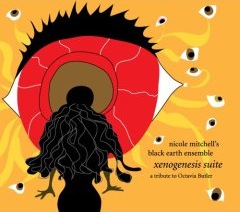Review by Brad Walseth
Octavia Butler was a singular soul. As an African American woman, she was unique among her fellow science fiction authors, but her uniqueness was also her strength as she was able to write from experience to portray the disadvantaged and dispossessed. Her most famous work, Kindred, told the story of a modern day black woman who time travels back into the days of slavery where she has to deal with conflicting emotions and hard choices. The Xenogenesis Trilogy is considered Butler's masterpiece. The first volume, Dawn tells the story of a young black woman who is abducted by aliens who seek to save their own species by intermingling with the human species, whom they consider inferior. The analogies to the black experience are unmistakable. Flautist/composer Nicole Mitchell, herself a black woman attempting to make her way in world dominated by white males, felt an affinity to Butler's work, and especially Dawn. The "Xenogenesis Suite" is based on the emotional reactions Mitchell got from the story, rather than specific storyline, but it captures the claustrophobic essence and sense of dread and helplessness inherent in Butler's story.
Mitchell's improvisatory nature and composition strengths seem well-suited to the task of bringing Butler's themes into a musical realm. Her use of odd time signatures and merging of free elements with composed especially serve her well in presenting With her stellar Black Earth Ensemble in tune with her vision, Mitchell has composed a suite that is as harrowing as it is beautiful. With David Boykin on tenor sax, Josh Abrams on bass, Marcus Evans on drums, Avareeyal Ra on percussion, Justin Dillard on piano and David Young on trumpet, the ensemble creates a dreamscape that is by turns a nightmare. Cellist Tomeka Reid, especially shines here, providing darkness and gravitas on pieces like "Smell of Fear." Meanwhile, vocalist Mankwe Ndosi provides the human element with her mostly wordless vocals that add to the unsettling effect.
Mitchell, as always allows her bandmates plenty of opportunities in the spotlight, and they all come through with aplomb. Pianist Dillard shows a nice avant garde touch on the keys, as on "Sequence Shadows," and the interplay between the horn players as well as that between the rhythm section members is exceptional. Boykin does his usual stellar work on the heart pounding "Adrenalin," proving again that he is a player who deserves wider recognition. However, when Mitchell does take a turn in the center, as on "Transition C," it is always a delight to hear this wonderful player cut loose. Obviously, this music is not going to be everyone's cup of tea. Those expecting "Lullaby of Broadway" may instead find themselves on a dark and lonely street within their own subconscious, but for those more adventurous listeners, the rewards are there, and the music serves as a true introduction and counterpart to Butler's groundbreaking work.
|

